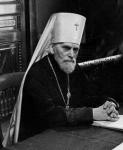Articles
/
Eparhy of Olonets and Kargopol
Eparhy of Olonets and Kargopol
Subject /
Religion. Church/Confession life
Subject /
Ethnic culture//
The Eparchy of Olonets and Kargopol. Othodox monasteries and churches of the Olonets region (the territories of present-day Korelia, partly of the Vologda and Leningrad Regions) were originally included into the Eparchy of Novgorod. The foundation of the Monastery of Venerable Alexander of Svir and and monasteries of his followers: the Korniliyevo-Padansky Monastery (now it is the present-day Lodeynoye Pole district), Vazheozersky Preobrazhensky Monastery, the AfanasiyevskySyandebsky Monastery, Adrianov Andrusovsky Monastery and others (all of them are located on the territory of the Republic of Karelia) became the most impotent stage of making the Eparchy of Olonets and Kargopol. The Eparchy of Karelia and then the Karelian suffragancy can be considered the forerunner of the Eparchy of Olonets and Kargopol. After abolishing the Karelian suffragancy in July 1764 the Olonets and Katgopol suffragancy was established and it has been until 1787. A part of Karelia parishes was under the suffragancy, other parishes were under the St. Petersburg Eparchy administration. Bishops of Olonets and Kargopol lived in the St.Alexander Svirsky Monastery of the Holy Trinity, where there was the administrative centre of the eparchy and a spiritual college. After abolishing the cathedra churches and monasteries were included to the Eperchy of Arkhangelsk and Kholmogori at first and then they were again included to the Eparchy of Novgorod. The independent Eparchy of Olonets and Petrozavodsk was formed in 1828 according to the order of Nicholas I. Until the 1920s a part of the territory of the present-day Leningrad Region (the former Lodeynoye Pole uyezd, partly the Olonets and Petrozavodsk uyezds of the Olonets Gubernia) was under the Eparchy of Olonets and Petrozavodsk. Eminent Ignatius, a vicar of Novgorod (1828-1842, from 1835 - archbishop), was appointed the first bishop of the eparchy with the permanent residence in Petrozavodsk. Under his rule about fourty churches were constructed, there were more than 160 village colleges in the eparchy. Under archbishop Benedict (1842-1850) children Reading-Writing Schools were organised; under bishop Arcadius (1851-1869) a Woman Eparchy College was opened. The Olonets Ecclesiastical Seminary was opened in Petrazavodsk in 1829. The opposition to the Old Belief was an impotant direction of the activity of Olonets archpastors, since the late 19th century preachings of the Lutheranism among Karelians became one more impotant direction of the activity. The Brotherhood of St. Alexander of Svir, the Mission Church Brotherhood of the Apostle Peter and Apostle Paul (from 1880), the Orthodox Karelian Brotherhood of St. George (from 1907) worked in the eparchy. The bulletin ""The Olonets Eparchy News"" was published since 1898. In 1910 in the eparchy there were 594 churches, 17 monasteries and 1724 chapels. 98.3 per cent of populations of the Olonets Gubernia were Orthodox believers. In the period of repressions after the October 1917 Revolution practically the all clergy was annihilated; the overwhelming majority of churches was closed. During World War II many churches on the territory, occupied by the Finnish troops, were opened again (for example in the village of Vazhini). Until 1947 and from 1949 the Eparchy of Olonets was governed by Gregory (Chukov), Metropolitan of Leningrad and Novgorod, later by Metopolitans of Leningrad and Ladoga. Since 1962 only four churches worked in Karelia: two churches worked in Petrozavodsk, one church worked in Sortavala and one church worked in Olonets; In the territory of the Leningrad Region there was only church in the village of Vazhini. The eparchy received the independent status on 19 July 1990, bishop Manuel became the first Head of the eparchy. The Cathedral of St. Alexander Nevsky in Petrozavodsk became the cathedral dome of the eparchy.
Authors
Bertash, Aleksandr Vitalyevich
Persons
Aleksandr Svirsky, St.
Arkady Olonetsky (Fyodorov, Grigory Fyodorovich), archbishop
Grigory (Nikoilay Kirillovich Chukov), metropolitan
Ignaty (Matfey Afanasyevich Semyonov), archbishop
Manuil (Vitaly Vladimirovich Pavlov), archbishop
Nicholas I, Emperor
Venedikt (Vasily Ivanovich Grigorovich), archbishop
Geography
Neighbouring Territories/Karelian Republic
Leningrad Oblast, the/Lodeynoye Pole District
Historical Toponyms/Olonets Gubernia (Province)/Lodeynoye Pole Uyezd
Historical Toponyms/Olonets Gubernia (Province)/Olonets Uyezd
Historical Toponyms/Olonetsky Krai
Historical Toponyms/Olonets Gubernia (Province)/Petrazavodsk Uyezd
Leningrad Oblast, the/Podporozhye District
Leningrad Oblast, the/Podporozhye District/Vazhyni Urban Settlement
Neighbouring Territories/Vologda Oblast, the
Bibliography
Православие в Карелии. Петрозаводск, 1987
Олонецкая епархия. Страницы истории. Петрозаводск, 2001
Владимир Сорокин, прот. Исповедник. Церковно-просветительская деятельность митрополита Григория (Чукова). СПб., 2005
Subject Index
Eparhy of Korelia
Eparhy of Novgorod
Holy Trinity Monastery of St. Aleksandr of Svir, the
Padansky Convent of the Presentation in the Temple
Mentioned in articles:
|
hidden
|
Grogory (Chukov) (1870-1955), metropolitan, clergy figure
Grigory (Nikolay Kirillovich Chukov; 1870-1955), Metropolitan, clergy figure, Doctor of Theology. Nikolay Kirillovich Chukov was born in a peasant family. In 1889 he graduated from the Olonets Ecclesiastical Seminary, in 1895 he graduated from the... more
|
|
|
|




